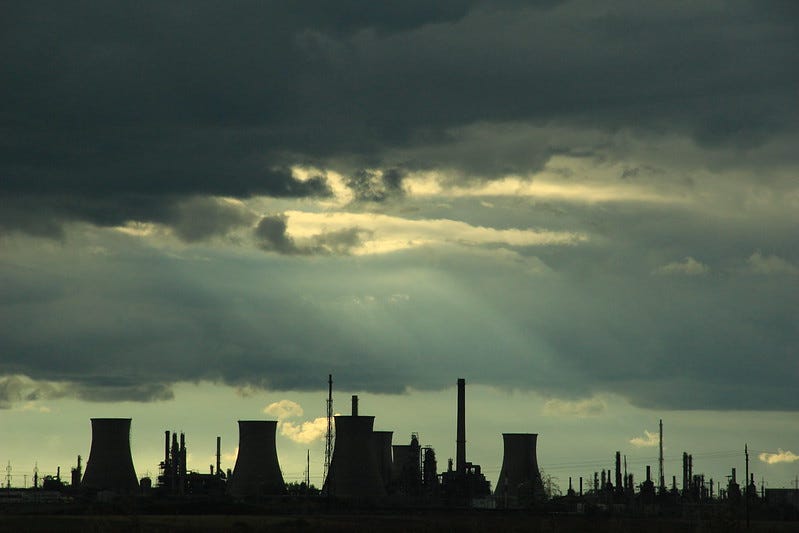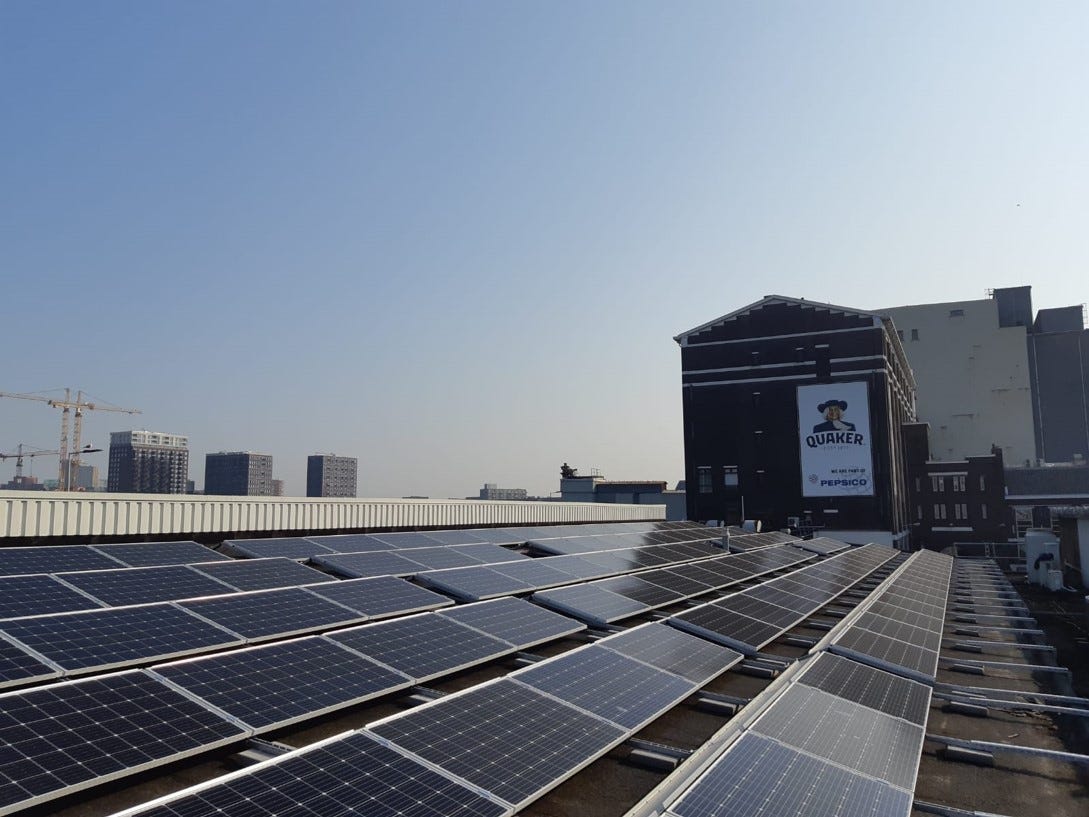ESG trade faces test as fossil fuel stocks rebound; plus Europe awaits Kerry's first move
Plus: Methane danger mandates Biden oil cap program sooner than later, and the case for green building spending
As President Biden’s team gets down to work on new climate initiatives, one phrase they’re hoping to avoid on Capital Hill is “Green New Deal,” which has become a term synonymous with anything radical or too progressive to pass Congress. But one aspect of the strategy that has always had bipartisan political backing is the idea of re-training oil and gas well workers to transition to renewable energy.
Part of that idea is that they would first work to help plug the two million open wells in the U.S. that are leaking methane, which is 80 times more harmful to the atmosphere than CO₂ in the first few decades. As I said in my ZEUS column yesterday, that is just a start. The re-training is the important part.
But a new study out this week in Canada indicates that it is a start we urgently need to get going on. The study says both the U.S. and Canada have vastly underestimated the amount of methane spewing from these wells, and indeed might have undercounted by more than half a million wells.
Earlier this week, the U.S. Chamber of Commerce, which has historically opposed climate initiatives in Washington D.C., made a small but important step in the direction of supporting activities like regulating methane. With its powerful business members now on board, a Biden jobs plan that includes finding and plugging these wells could come within his 100-day climate sprint.
Just don’t credit the Green New Deal.
Note to readers: Callaway Climate Insights will move to a subscription model on Feb. 8. Subscribers will have access to our most valuable content and data, special invitations to webinars and online conferences, and receive first insights on breaking news as it develops, ahead of free readers. Subscribe today to get a special founders rate, which will never increase. Or pay monthly or annually.
More insights below. . . .
Don’t forget to contact me directly if you have suggestions or ideas at dcallaway@callawayclimateinsights.com.
“We are not going back to the Obama years.“ Why re-joining Paris is not enough: EU notebook
. . . . European Union officials greeted the incoming Biden administration with relief and optimism this week, but it will take more than a promise to rebuild trust after four years of Trump, writes Vish Gain from Dublin. Key to success will be John Kerry, the new climate czar and one of the founding fathers of the Paris Accord in 2015. Europeans have a long list of initiatives they’d like to work on jointly with the U.S., but they will want to first see evidence that the U.S. is getting its own climate house in order. “We are not going back to the Obama years,” said EU Climate Commissioner Frans Timmermans.
Europe is going all-in with its offer to collaborate with the U.S., having proposed a transatlantic regulatory framework for sustainable finance to boost green investments in the private sector — with lessons from the success of the EU taxonomy.
Also in its hamper basket is a proposed joint effort against deforestation, ocean protection, brokering a global plastics treaty, and a green tech alliance to create markets for clean and circular technologies such as renewables, grid-scale energy storage, clean hydrogen, and carbon capture, storage and utilization.
ESG trade faces test as fossil fuel stocks rebound in New Year

. . . . Fossil fuel stocks, after one of their worst years in a decade in 2020, are on a tear, providing the first real test of the ESG performance theme at just the time the nation is supposedly turning toward renewable energy, writes Mark Hulbert. A New Year’s rally in oil and gas stocks underscores a quiet rebound in the sector in the past few months that has suddenly attracted the attention of momentum traders. For investors who piled into environmental, social, and governance stocks and funds looking for better returns, this presents a conundrum. Profit or purpose.
This appears to already be happening. Bank of America data show that energy stocks last week experienced the second-largest inflow in nearly four years. Think about that for a second. As the presidency is assumed by someone who promises to promote clean energy, succeeding a president who actively opposed clean energy and promoted the fossil fuel industry, we’re experiencing one of the largest influxes of new money in years into fossil fuel stocks. This has the momentum traders’ fingerprints all over it. . . .
ZEUS: Trump’s out. Biden’s president. Now comes the hard part
. . . . The flags have been tucked away. The music has stopped. The celebrities have gone home. A 22-year-old poet is the new social media star. Now the messy process of governing begins for the Biden administration, writes David Callaway. Repairing the damage to climate and racial justice of the Trump term will take years. President Biden has two before Congressional elections. Less than 100 weeks. For climate finance investors, the stakes have never been higher.
The president acknowledged himself that words are not enough to solve these problems. We can expect dozens of executive orders, new regulations and new proposals in the next several weeks, as a plan takes shape to make change through a series of initiatives instead of one giant new law.
This is where the new battle lines will be drawn. By fossil fuel companies committed to a slower transition. Politicians and businesses concerned about losing jobs. And as we’ve already seen even before Biden took office, the inevitable political battle over the cost of these new proposals. Can we really vaccinate the entire country and rebuild the economy with green infrastructure at the same time? Battle line No. 1. . . .
Data driven: Energy efficiency is building

Just $1 of every $38 spent on building construction in 2019 was spent on energy efficiency, opening the door to green building investment.
. . . . Global investment on energy efficient buildings increased for the first time in three years in 2019, as the $152 billion spent that year on energy efficiency within the construction industry represented a 3% jump from previously flat spending of $148 billion in 2017 and 2018, according to the recently published 2020 Global Status Report for Buildings and Construction compiled by the UN Environment Programme. In today’s data point, George Barker writes about how sustainable construction spending is expected to lay the groundwork for a $25 trillion investment opportunity over the next decade. . . .
News briefs: PepsiCo goes greener, Indian firm sees smog as resource
Editor’s picks:
PepsiCo adds a whole lot more fizz to its climate efforts
India’s killer smog transformed into ink, paint and tiles
Bay State boss boots sweeping global warming legislation
Baltimore is bellwether for climate-change claims against Big Oil
Skål! Warming heats up Scandinavian wine industry
Latest findings: New research, studies and projects

Fossil fuel subsidies in the EU: opportunities and estimates
From the abstract: The paper aims to identify and analyze potential legal avenues for phasing out fossil fuels in the European Union using EU State aid rules. Our analysis of the EU’s legal framework reveals that the EU State aid rules would allow the European Commission to effectively target and monitor fossil fuel subsidies. In particular, the requirements for notification, examination, transparency, reporting, and recovery of unlawfully granted aid may be highly useful tools. The legal framework also provides avenues for the EU Commission to start a “Fossil Fuel Inquiry” to identify and quantify all support for fossil fuels within the EU Member States. The authors conclude that despite inherent limitations, the EU state aid toolbox offers various possibilities to the EU to actively advance its climate change policy and comply with its international commitments to reduce fossil fuel subsidies. Authors: Julian Nowag, Lund University Faculty of Law, Oxford Centre for Competition Law and Policy; Luis Mundaca, Lund University; Max Åhman, Lund University. Available at SSRN.
More of the latest research:
Researchers: Earth to reach critical temperature tipping point in 20 to 30 years
People buying SUVs are canceling out climate gains from electric cars

Words to live by . . . .
“Best wishes on this most significant day for the American people! We are together. We will be stronger to face the challenges of our time. Stronger to build our future. Stronger to protect our planet. Welcome back to the Paris Agreement!” — French President Emmanuel Macron, on Joe Biden’s inauguration.





